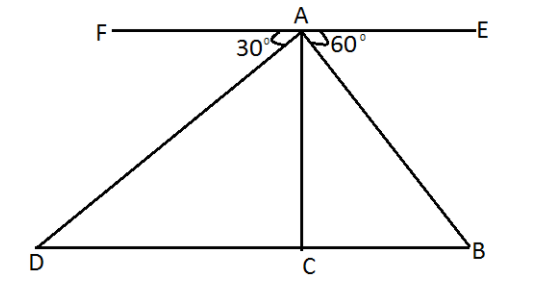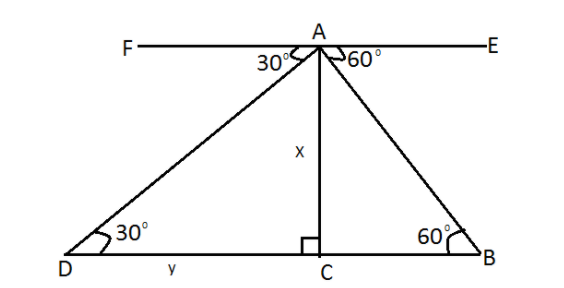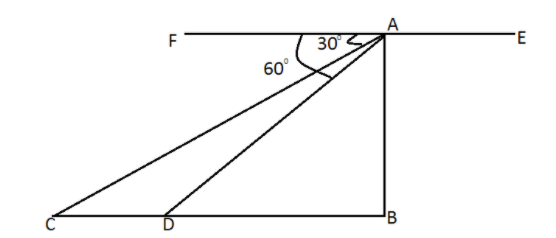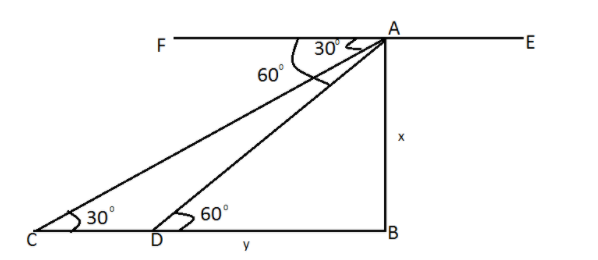Question
Question: From an aeroplane vertically above a straight horizontal road , the angles of depression of two cons...
From an aeroplane vertically above a straight horizontal road , the angles of depression of two consecutive kilometres stones on (i) opposite (ii) same sides of aeroplane are observed to be 30∘ and 60∘ . Find the height of the aeroplane above the road in two cases .
Solution
As we have to find the vertical height of the aeroplane in case (i) Consider the both stone is opposite to the aeroplane and the distance between them is a kilometre in the case (ii) Consider the both stone at the same side of the aeroplane and the distance between them is a kilometre now solve both the cases by using the tanθ=BaseAltitude .
Complete step-by-step answer:
In this question it is given that the an aeroplane vertically above a straight horizontal road , the angles of depression of two consecutive kilometres stones so for the opposite side
the figure become

Where at point A the aeroplane is it , and angle of depression is given in the figure as in the question the distance between the stones is 1 km hence DB = 1 km
Let the vertical height AC is x km and DC = y
As from the Transverse angle ∠ADC = 30∘ and ∠ABC = 60∘

In triangle ADC , AC is perpendicular to DB therefore ,
tan30∘=DCAC = yx
As we know that the tan30∘=31 on putting the above
⇒ 31=yx
y=3x .........(i)
In triangle ABC , AC is perpendicular to DB therefore
tan60∘=BCAC
As it is given that DB is 1 km and DC = y hence BC = 1−y
⇒ tan60∘=1−yx
As from equation (i) y=3x and we know that tan60∘=3 , On putting it in above equation
⇒ 3=1−3xx
On cross multiplication ,
⇒ 3−3x=x
⇒ 4x=3
Hence x=43=0.433
Hence the vertical distance in opposite case is 0.433 Km
(ii) If the stones are at the same side the

Where at point A the aeroplane is it , and angle of depression is given in the figure as in the question the distance between the stones is 1 km hence DC = 1 km
Let the vertical height AB is x km and DB = y
As from the Transverse angle ∠ACB = 30∘ and ∠ADB = 60∘

In triangle ADB , AB is perpendicular to DB therefore ,
tan60∘=DBAB = yx
As we know that the tan60∘=3 on putting the above
⇒ 3=yx
⇒ y=3x .........(i)
In triangle ABC , AB is perpendicular to DB therefore
tan30∘=BCAB
As it is given that DC is 1 km and DB = y hence BC = 1+y
⇒ tan30∘=1+yx
⇒ 3+x=3x
As from equation (i) y=3x and we know that tan30∘=\Rightarrow31 , On putting it in above equation
⇒ 31=1+3xx
On cross multiplication , we get 2x=3
⇒ 1+3x=3x
Taking LCM on LHS then cross multiple ,
⇒ 33+x=3x
On solving further ,
⇒ x=23=0.866
Hence the vertical distance in opposite case is 0.866 Km
Note: The angle of elevation is defined as an angle between the horizontal plane and oblique line from the observer’s eye to some object above his eye.
The angle of depression is defined as an angle constructed by a horizontal line and the line joining the object and observer’s eye
